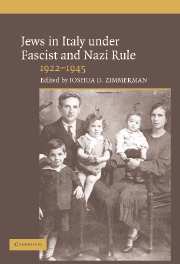Book contents
- Frontmatter
- Contents
- Acknowledgments
- Abbreviations
- List of Contributors
- Map 1. The Jews of Italy, 1938
- Map 2. Principal Centers of Anti-Jewish Persecution, 1938–1943
- Introduction
- Part One ITALIAN JEWRY FROM LIBERALISM TO FASCISM
- Part Two RISE OF RACIAL PERSECUTIONS
- 4 Characteristics and Objectives of the Anti-Jewish Racial Laws in Fascist Italy, 1938–1943
- 5 The Exclusion of Jews from Italian Academies
- 6 The Damage to Italian Culture: The Fate of Jewish University Professors in Fascist Italy and After, 1938–1946
- 7 Building a Racial State: Images of the Jew in the Illustrated Fascist Magazine, La Difesa della Razza, 1938–1943
- 8 The Impact of Anti-Jewish Legislation on Everyday Life and the Response of Italian Jews, 1938–1943
- 9 The Children of Villa Emma at Nonantola
- 10 Anti-Jewish Persecution and Italian Society
- Part Three CATASTROPHE – THE GERMAN OCCUPATION, 1943–1945
- Part Four THE VATICAN AND THE HOLOCAUST IN ITALY
- Part Five AFTERMATH: CONTEMPORARY ITALY AND HOLOCAUST MEMORY
- Index
- Plates A–D
8 - The Impact of Anti-Jewish Legislation on Everyday Life and the Response of Italian Jews, 1938–1943
Published online by Cambridge University Press: 22 September 2009
- Frontmatter
- Contents
- Acknowledgments
- Abbreviations
- List of Contributors
- Map 1. The Jews of Italy, 1938
- Map 2. Principal Centers of Anti-Jewish Persecution, 1938–1943
- Introduction
- Part One ITALIAN JEWRY FROM LIBERALISM TO FASCISM
- Part Two RISE OF RACIAL PERSECUTIONS
- 4 Characteristics and Objectives of the Anti-Jewish Racial Laws in Fascist Italy, 1938–1943
- 5 The Exclusion of Jews from Italian Academies
- 6 The Damage to Italian Culture: The Fate of Jewish University Professors in Fascist Italy and After, 1938–1946
- 7 Building a Racial State: Images of the Jew in the Illustrated Fascist Magazine, La Difesa della Razza, 1938–1943
- 8 The Impact of Anti-Jewish Legislation on Everyday Life and the Response of Italian Jews, 1938–1943
- 9 The Children of Villa Emma at Nonantola
- 10 Anti-Jewish Persecution and Italian Society
- Part Three CATASTROPHE – THE GERMAN OCCUPATION, 1943–1945
- Part Four THE VATICAN AND THE HOLOCAUST IN ITALY
- Part Five AFTERMATH: CONTEMPORARY ITALY AND HOLOCAUST MEMORY
- Index
- Plates A–D
Summary
This chapter will focus on one aspect of the wider issue of Fascist anti-Semitic policy in Italy in the years 1938–43: the impact of the laws on individual Jews and Jewish identity and the varied responses of Jews. I have chosen, therefore, to concentrate on Jews as subjects of the events rather than as objects, thereby enabling us to gain a wider understanding of the period. In collective memory, Fascist Italy has often been considered a safe haven whereby Jews could find a secure place to reside without being persecuted. This stereotype is even reinforced by some latent problems laying within the collective memory of Italian Jewry. We find in interviews and in memoirs an often apologetic tone in Italian survivors' descriptions of everyday life under the anti-Semitic legislation, such as “that was, of course, nothing compared to Auschwitz,” or “we didn't really suffer.” Memory of the German occupation from 1943 to 1945 (which includes both the memory of the extermination of Jews and the help received by many from the non-Jews) clouds the memory of the previous period, therefore obscuring the real extent of the impact of Italy's own anti-Semitic legislation. This problem can be specially found in memoirs and in oral testimonies. Thus, we need other personal materials from the period itself, such as diaries, letters, and official documents, that can help to rectify these problems because they often dictate and describe Jewish life under Italy's anti-Semitic legislation.
Another issue lies in what we may call collective guilt feelings.
- Type
- Chapter
- Information
- Jews in Italy under Fascist and Nazi Rule, 1922–1945 , pp. 158 - 181Publisher: Cambridge University PressPrint publication year: 2005
- 4
- Cited by



